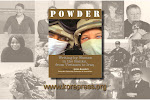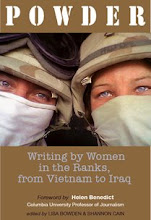 Charlotte Brock is the author of the
Charlotte Brock is the author of the Powder
essay "Hymn." Her interview with Liane Hanson of Weekend Edition Sunday can be heard here.I think the book trailer is great and you did a wonderful job putting it together. I do have one comment though.
To say that women see or experience war differently than men is a questionable statement. I think that women see and experience war the same way as men 90% of the time. They have the same reasons for joining, the same experiences, the same worries, anxieties, joys, successes... They just also have a few extra experiences or views that most men don't. But for the most part, women are just soldiers, sailors, airmen, and marines... no better, no worse, and not that different. To say that we are intrinsically different just because of our gender actually could be a disservice to women who are trying so hard NOT to be singled out. It implies that we are more sensitive, therefore more in need of extra consideration and special treatment...
You can see how this is a slippery slope. The thing to keep in mind is that we authors do not represent "women in the military." The very fact that we are writers makes us exceptions to the majority of military women. Because we write, we are sensitive beings, we do think about things more deeply than most people, male or female. There are many, many sensitive military males out there, who experience things differently than the majority of military people. To say that we have a different experience than men who feel compelled to perpetuate a masculine posturing is really falling back on and reinforcing a stereotype of military men that can be harmful both to gender relations within the military and to perceptions of the military by the general public.
And why would the fact that women are not easily accepted in the military make women see things more objectively than men? We may... but this argument needs some backing up. As I said, the women who wrote for this book are exceptional among military women because they are writers, and because they chose to share their experiences for this book. Many, many (I would say most) military women are just as bit as swaggery, "insensitive," straight-shooting, etc, as some of their male counterparts (and are these characteristics really "male" or are we just told that that's what being masculine means?). Many have absolutely no experience of sexism in the military. Some really resent the women who point out the differences between men and women, thereby making it more of an issue, and more difficult for them to fit in seamlessly.
I am not saying I am one of them... But men who oppose women's full participation on the battlefield will use exactly the same kind of argument: women are different, women need to be treated with sensitivity, women deserve special consideration, women represent a more delicate, complex type of person than men. Therefore they should be protected, therefore they do not belong on the battlefield.
Yesterday, at Col John Ripley's funeral, the Commandant of the Marine Corps spoke. And for some reason, he felt the need to mention that Col Ripley, although supportive women's presence in the military, was adamantly opposed to women being in combat zones or filling combat roles. He said (and this was at the Naval Academy, in front of an audience of male and female midshipmen), that women are different from men, that they should never be in combat, and that there's sheep and there's wolves, and on the battlefield, the sheep are always going to kill the wolves.
Needless to say I was shocked and saddened and demoralized, as I sat there in my uniform, with four medals awarded in part for being in a combat zone, knowing that all those young female midshipmen who were trying so hard to earn their place were probably sitting there sad and confused... He had just made it so easy for the male midshipmen to look down on the females, to view them as second-class citizens, not quite their equals. (Comparing us to sheep was just really uncalled for). And that's coming from the senior person in the entire Marine Corps, someone who's supposed to at least pretend to be supportive of his thousands of female Marines, many of who are busting their butts to accomplish the mission he sets for the Marine Corps in combat zones today.
Col Ripley held the view that women represent the best, most precious aspect of what it is that men fight for, or the homeland, and that because of this they don't belong on the battlefield. When we women emphasize that we are different, that we have a different perspective, it reinforces what people like the commandant think: that we are a different species from men and that we need protection, not equality (and equal opportunity to compete for all jobs and positions.)
I don't know what the other authors think, but I would suggest that we all try to refrain from making generalizations about men or women in the military. There may be some very open-minded, pro-women military guys out there who really want to like this book but are a bit turned off by the suggestion that military men are mostly swaggering macho types and that women, by virtue of being women, have a deeper understanding or perspective than they do. Many war stories written by men show deep sensitivity and complex emotions and insights, and little swaggering. (A Soldier of the Great War, Goodbye Darkness...)
I just wanted to say this to add to the discourse and maybe bring up some issues that may not have come up yet. I love the book and the essays and think it's important to get a feminine perspective out there. But we all speak only for ourselves, and our experiences have at least as much to do with our individual personalities and circumstances as our gender.
--Charlotte Brock




















